-
CENTRES
Progammes & Centres
Location
Even as the coronavirus pandemic strains European solidarity, its ideas on social protection experience a fillip — but this time on the other side of the Atlantic.

The novel coronavirus originated in China, but the west has suffered the brunt of the ensuing pandemic the most. In terms of active cases, the US is now the epicentre of the COVID-19 crisis. With over a million cases, it accounts for a third of the world’s total cases and over ten times that of China’s total cases. In Europe, even as Germany reaches its peak, the death toll in Italy, Spain and France has crossed 24,000 each. Cumulatively, deaths in Europe (including UK figures) have been about twenty times that of China’s figures. Even as both sides of the Atlantic continue to reel under the novel coronavirus, traditional prospects for transatlantic cooperation remain elusive.
The United States and Europe have been the standard-bearers of the liberal world order. This has encompassed championing economic interdependence and free movement of people, all whilst being held together under the “most successful” multilateral security alliance in the world. Over the past three years however, the Donald Trump administration has strained US ties with Europe. His administration has broken from US foreign policy precedent by viewing EU economic cohesion as a competitive force to American economic primacy, fanning right-wing populism on the continent by continually weighing-in on UK-EU Brexit negotiations, and construing European defence as a drain on US largesse towards the North Atlantic Treaty Organisation.
With COVID-19, the administration has now even attributed the spread of COVID-19 in the US to Europe serving as a stepping stone for the virus to reach the arrival lobbies of American airports. Announcing the suspension of flights from Europe in mid-March, Trump said, “The European Union failed to take the same precautions and restrict travel from China and other hotspots. As a result, a large number of new clusters in the United States were seeded by travellers from Europe.”
The Trump administration has also engaged in beggar-thy-neighbour policies by ordering US companies like 3M to halt export of N95 masks to foreign markets. In one instance, a shipment of 200,000 masks on its way to Germany from a 3M factory in China was even “confiscated” by US officials in Thailand. Over the past few weeks, French and German officials have even complained about the US having engaged in “Wild West” tactics to outbid for medical equipment. This latest thorn in transatlantic ties comes at a time when the coronavirus has begun to pose an existential threat to European solidarity.
European solidarity was already put in jeopardy in 2016 when the UK — the second largest economy in the European Union, voted to leave. More so, with the elongated UK-EU discussions over the terms of Brexit, Brussels faced a ‘damned if you do, damned if you don’t’ scenario. If it were to hand the UK a favourable severance deal, it would risk accentuating calls for breaking away from the Union in other EU states. If it were to play hard-ball on negotiations to set a precedent against any future defections, it would counterintuitively only fan right-wing populist dogma over Brussels holding every member-state’s sovereignty on a tight leash.
Now in face of the COVID-19 pandemic, old fault-lines over the fiscal management of the Union are re-emerging. For instance, last month, the European Central Bank (ECB) announced that it would buy an additional €750 billion worth of European corporate and government bonds this year, to “offset the adverse economic impacts of the coronavirus outbreak.” The ECB relaxing its “self-imposed restrictions” on purchasing government bonds, also reignited the stalled debate on a Eurobond — a “common bond that financial institutions across Europe could use as collateral when borrowing from each other and from central banks.” Although wealthier northern European governments grudgingly accepted the additional purchase of bonds, countries like Germany, Austria and the Netherlands have long opposed the idea of introducing a common bond citing “fears that irresponsible governments could use the eurobond to go on a spending spree.”
Their concerns with even a one-of common bond (like say, ‘coronabonds’) pertain to the slowing of austerity measures by encouraging the “mutualisation of debt.” The ire has been directed against high debt-to-GDP ratio member-states like Italy and Spain — which now incidentally are also most in need as the worst-hit by the coronavirus.
In addition, the impulse for beggar-thy-neighbour approaches isn’t limited to the US. In the early stages of the coronavirus’ spread in Europe, France and Germany had banned the export of essentials like masks to other EU member-states, despite “the fact that the EU is supposed to be a single market.” In France, the ban was also applicable to the export of products by international companies that merely had their distribution warehouses there. For one such Swedish company, the French “confiscation was tantamount to nationalising a private company belonging to a European partner.” Amidst this compounding strain to European solidarity, its long-championed ideas on social protection are gaining popularity — but across the Atlantic.
On the campaign trail, Sen. Bernie Sanders (I-VT) often touted the European model of mixing welfare state with markets. In making single-payer ‘Medicare for All’ the centrepiece of his campaign, Sanders cited European and Scandinavian successes with government-run healthcare systems.
As this health crisis exposes the frailty of the current US social protection system, the COVID-19 pandemic in many ways is serving as a validation of Sanders’ vision. It is reported that the US’ fight against coronavirus stands impeded as nearly 12 percent of the US population remains uninsured and 23 percent are deemed to be underinsured. In addition to these 87 million that are uninsured or underinsured, over 150 million Americans — who have health insurance through their employers, are now facing uncertainty in these times of rising unemployment. Thus, the devastation “wrought by the coronavirus could push US voters to favour policies supporting social security measures like universal healthcare or stronger retirement schemes.”
But, Sanders failed to muster enough momentum after early wins in New Hampshire and Nevada to come within striking distance of the Democratic nomination. However, after now suspending his campaign and endorsing former Vice-President Joe Biden, Sanders and his “progressive” constituency still have an opportunity to shape the debate on healthcare against the backdrop of the coronavirus pandemic.
The Biden campaign is now reportedly discussing a “unified platform” in consultation with the Sanders camp. Wherein, he is expected to embrace some of Sanders’ positions that are popular amongst young progressives — a voting group that Biden has struggled with. Although Biden is mostly expected to make the biggest accommodations on foreign policy issues, he has already come partially in support of some progressive domestic ideas, like that over student loan relief, bankruptcy reforms, and Medicare for 60-year-olds.
It is unlikely that Biden will eventually come around to fully embrace Sanders’ position on ‘Medicare for All’ which would controversially also entail abolishing private insurance (a move Biden has opposed). However, rising support for wider, government-run, European-style social protection programmes against the backdrop of COVD-19 pandemic, is sure to energise the next generation of American progressives — like Rep. Alexandria Ocasio-Cortez (D-NY-14), well beyond the 2020 elections. This is evident in the findings of exit/entrance polls of all recent primary contests, wherein most Democrats — in some states even as many as two-thirds and more — favoured “a government plan” for healthcare.
Thus, even as the COVID-19 pandemic frays transatlantic cooperation and strains European solidarity, Europe’s long-championed idea on social protection is gaining popularity amongst American progressives.
The views expressed above belong to the author(s). ORF research and analyses now available on Telegram! Click here to access our curated content — blogs, longforms and interviews.

Kashish Parpiani is Senior Manager (Chairman’s Office), Reliance Industries Limited (RIL). He is a former Fellow, ORF, Mumbai. ...
Read More +